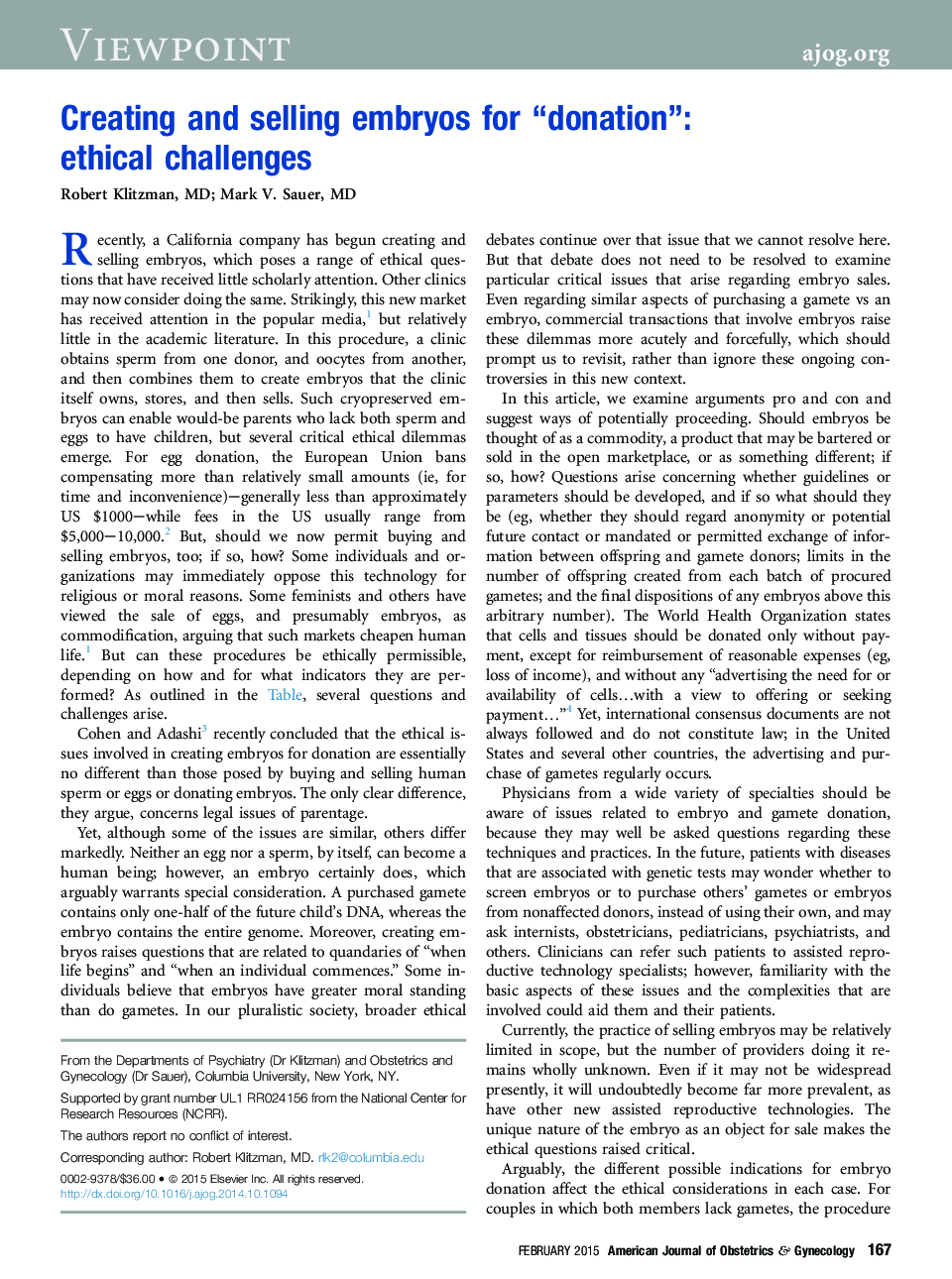| کد مقاله | کد نشریه | سال انتشار | مقاله انگلیسی | نسخه تمام متن |
|---|---|---|---|---|
| 6145600 | 1594909 | 2015 | 5 صفحه PDF | دانلود رایگان |
عنوان انگلیسی مقاله ISI
Creating and selling embryos for “donation”: ethical challenges
ترجمه فارسی عنوان
ایجاد و فروش جنین برای اهدای خون: چالشهای اخلاقی
دانلود مقاله + سفارش ترجمه
دانلود مقاله ISI انگلیسی
رایگان برای ایرانیان
کلمات کلیدی
تکنولوژی باروری کمک می کند، سود، اخلاق، خطر،
ترجمه چکیده
ایجاد و فروش تجاری جنین ها آغاز شده است، که مجموعه ای از سوالات اخلاقی است که توجه کمی را به خود جلب کرده اند. بعضی از نگرانی هایی که بوجود می آیند، شبیه به مواردی است که در فروش گاست ها وجود دارد، در حالی که مسائل دیگر به طور قابل توجهی متفاوت هستند. برای اولین بار، در مورد حقوق کودک و نوزادان و توانایی آنها در شناختن والدین بیولوژیکی، سوالات مطرح شده است. شرکت هایی که جنین انسان را تولید می کنند، ممکن است بخواهند گارانتی را به صورت ناشناس نگه دارند. بنابراین بسیاری از این فرزندان هرگز یاد نمی گیرند که والدین آنها والدین زیست شناختی خود نیستند. با این وجود، چنین افشائی هایی در مورد نه تنها یکی از والدین زیست شناختی، هر دو می تواند برای این افراد مهم باشد؛ و فقدان این دانش ممکن است سلامت جسمی و روانی آنها را مختل کند. دوم، سطح سوالات مربوط به هزینه هایی است که ارائه دهندگان برای جنین باید بپردازند و اینکه آیا این مقدار ها باید براساس صفات 1 یا هر دو اهدا کننده گیت باشد. بعضی از والدین آینده نگر ممکن است در یک کودک خاص به دنبال ویژگی های خاصی (مانند قد و یا رنگ چشم / مو)، که موجب ایجاد جنین از 2 اهدا کننده گیم می شوند که دارای این ویژگی ها هستند. سوم، مالکیت جنین بدون دستورالعمل پیشرفته توسط بیماران ایجاد معضلات (به عنوان مثال، قرار دادن هر گونه جنین باقی مانده) ایجاد می کند. چهارم، دستورالعمل هایی برای محدود کردن تعداد جنین هایی که از هر جفت اهدا کنندگان گیت به فروش می رسند وجود ندارد. از این رو، بدون توجه به یکدیگر، خواهر و برادر کامل می تواند به طور بالقوه ملاقات، ازدواج و تولد. این بحث چندین عامل مهم برای فعالیت های آینده و آموزش و پرورش و سیاست های حرفه ای دارد. بیماران مبتلا به بیماری های مرتبط با آزمایش ژنتیک می توانند از متخصصان دندانپزشکی، متخصصین زنان و پزشکان دیگر در مورد این تکنیک ها و شیوه ها بپرسند. پزشکان می توانند این بیماران را به متخصصان فناوری باروری کمک کنند؛ با این حال، آشنایی با جنبه های اساسی مسائل و پیچیدگی ها می تواند به این ارائه دهندگان و بیماران خود کمک کند. تعدادی از این مسائل را می توان به راحتی از طریق دستورالعمل های انجمن های حرفه ای (به عنوان مثال، محدود کردن تعداد جنین های فروش شده از هر جفت اهدا کنندگان اهدا) . از آنجا که ایجاد و فروش جنین ها به احتمال زیاد گسترش می یابد، توجه به پاسخ های مناسب برای تعیین استانداردهای مراقبت از فرزندان آینده ضروری است و اطمینان از اعتماد عمومی در حال انجام است.
موضوعات مرتبط
علوم پزشکی و سلامت
پزشکی و دندانپزشکی
پزشکی و دندانپزشکی (عمومی)
چکیده انگلیسی
The commercial creation and sale of embryos has begun, which poses a series of ethical questions that have received little scholarly attention. Some of the concerns that arise are similar to those posed by the sale of gametes, while other issues differ markedly. Questions emerge, first, regarding the rights of the unborn children and their ability to know their biological parents. Companies that create human embryos de novo may wish to keep gamete providers anonymous. Many of these offspring thus will never learn that their parents are not their biologic parents. Yet, such disclosures, regarding not only one but both of these biologic parents, may be important for these individuals; and a lack of this knowledge may impede their physical and psychological health. Second, questions surface regarding the fees that providers should charge for embryos and whether these amounts should vary based on the traits of 1 or both of the gamete donors. Some prospective parents may seek specific traits in a baby (eg, height or eye/hair coloring), which prompts the creation of embryos from 2 gamete donors who possess these characteristics. Third, ownership of embryos created without an advanced directive by patients poses dilemmas (eg, disposition of any remaining embryos). Fourth, guidelines do not yet exist to limit the number of embryos sold from each pair of gamete donors. Hence, unbeknownst to each other, full siblings could potentially meet, get married, and procreate. This discussion has several critical implications for future practice and professional education and policy. Patients with diseases associated with genetic tests may well ask obstetricians, gynecologists, and other physicians about these techniques and practices. Clinicians can refer such patients to assisted reproductive technology specialists; however, familiarity with the basic aspects of the issues and complexities involved could aid these providers and their patients Several of these issues can be addressed relatively easily through guidelines from professional associations (eg, limiting the number of embryos sold from each pair of gamete donors). Because creation and sales of embryos will likely spread, consideration of appropriate responses is critical to establish standards of care to help the future offspring, and ensure ongoing public trust.
ناشر
Database: Elsevier - ScienceDirect (ساینس دایرکت)
Journal: American Journal of Obstetrics and Gynecology - Volume 212, Issue 2, February 2015, Pages 167-170.e1
Journal: American Journal of Obstetrics and Gynecology - Volume 212, Issue 2, February 2015, Pages 167-170.e1
نویسندگان
Robert MD, Mark V. MD,
